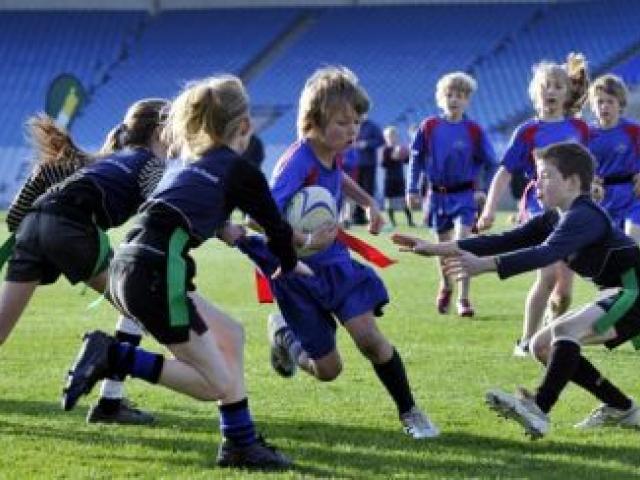
Lurking on the sidelines of children's sport is a perception that the earlier they are enrolled in structured competition, the better. But that might not be the case. Shane Gilchrist reports.
Ruby Flannery is wheeling a rather large goal hoop away from a court on which, for the previous 40 minutes, she has been practising her skills.
On a cold Saturday morning in Alexandra, the 5-year-old and her fellow netballers are wrapped in various layers, the mix of colours augmented by a flush of red on the cheeks of some participants.
Ruby's mum, Fun Ferns netball coach Nicola Jones, has also been on the move, instructing and encouraging these young players on ways to pass and shoot, while parents, grandparents and siblings watch with typically varying degrees of interest.
Although a game has been played, the consequence of the result is negligible, dwarfed by wider concerns of participation, perhaps even potential.
Such words are foreign to most 5-year-olds. Ambition is something that arrives later in life. Ruby might be the daughter of a former Otago senior netball coach but she is also a child who, 15 or 20 minutes into a practice, might just retreat behind a goalpost and sit out the remainder of the session.
"That doesn't actually worry me," Ms Jones says. "Some people ask, 'Doesn't that frustrate you?' Well, she's only 5 and she loves doing the skill part but isn't interested in the game."
Yet isn't sport all about winning and losing (or sometimes drawing)?
The answer is: yes and no. Among those with a passion for competition are some who believe it is also important to focus on goals more distant than the posts, nets or hoops that lure legions of primary school-aged children to fields and courts throughout the country.
Commit a young child to years of practice and season upon season of organised competition and that kid's bedroom eventually might house a Rory McIlroy-like talent, but such extended involvement could also end in implosion, boredom or burnout (from go, Tiger, to whoa, Tiger).
John Reid, a leading administrator with Sport and Recreation New Zealand (Sparc), the Crown entity established in 2003 to incorporate the previous functions of the Hillary Commission, the New Zealand Sports Foundation and the policy arm of the Office of Tourism and Sport, believes society has raised the stakes for children playing sport.
"We are now dealing with kids aged 5 or 6 entering sport as opposed to 9-year-olds or 10-year-olds," Mr Reid, a former New Zealand test cricketer and Sparc's manager community sport and recreation, says.
"Anecdotally, and I think quite clearly, if you went back to the 1960s, '70s and '80s, you'd find fewer kids aged younger than 8 enrolling with clubs.
"Back then there might have been athletics, gymnastics and swimming - that was quite common - but in terms of formal, organised sport, it was quite uncommon."
The 2008-2009 National Survey of Children and Young People's Physical Activity and Dietary Behaviours, commissioned by Sparc together with the ministries of health, education and youth development and involving more than 2500 participants, found 99.5% of 5 to 9-year-olds engaged in an hour or more of moderate- to vigorous-intensity physical activity per day.
Significantly, those children spent an average of 23 minutes a day playing organised sport (which refers to any sports, games or activities that are structured in nature, as opposed to time spent in free play). Those aged 10 to 14 years spent the most time in organised sport (42 minutes per day).
Closer to home, a Sport Otago survey of 16 primary schools in the region, conducted late last year to identify pupils' needs, shows that about 60% of pupils play sport either at school or for a club, with just over 11% playing three or more sports, between 16%-17% playing two or more codes, and more than 30% playing one sport.
Richard Kinley, Sport Otago programme director, says children are signing up to join clubs at a younger age but they might not necessarily be playing structured sport.
"They are getting involved in foundation skills as opposed to being chucked into a team that is playing games.
"I take 4-year-olds and 5-year-olds for soccer skills on a Saturday morning. They come up and do skills and a wee run-around and a pretend game, but that didn't happen four years ago," Mr Kinley says.
"I read a survey on who made the decision of what sports kids play and it is around 80% of mums decide."
According to Sparc's observations, there are two or three key drivers to young children playing sport.
"Sporting codes have certainly marketed their games to a younger audience," Mr Reid says. "And that is about getting more revenue from players.
"It is not just about the development of players, though clearly that is a motivation. The more you can spread your fixed costs across a bigger subscription base ...
"Also, I think this idea of 'earlier is better' has come about because of the growth of professional sport since the 1980s.
"Careers in sport are now seen as very attractive.
"The chances of that 5-year-old eventually becoming a professional sportsperson are extremely minute, but the feeling is if you get them into sport then perhaps there is an option of a career that is well paid. People can make a living out of a game much more than they used to," Mr Reid says.
"Equally importantly, there has been an increased demand from parents. To be fair to sports bodies, one of the problems is the expectation of our communities.
"Communities seem to think that earlier is better, that organised is better, and that uniforms and fancy rules are better."
This perception worries Sparc. It is creating a socio-economic division, depriving some children of the opportunity to take part in various codes.
"I'm really concerned about the cost of sports participation," Mr Reid says. "Because we are now requiring 5-year-olds and 6-year-olds to have tracksuits and uniforms, it becomes quite expensive. Sport then becomes exclusive.
"We are urging many of our sports to examine the cost of that entry point. Things like council charges are not within the realm of clubs to change, but uniforms are. Could they not get away with a white T-shirt? We have become obsessed with formality.
"Parents want kids' sports to be the same as the adults' games. I dispute that entirely. Why are we spending hundreds of dollars [in fuel] shipping 5-year-olds around? It takes two hours to get from one side of Auckland to the other; what a waste of time."
Given sport comprises a significant part of the activity levels of many primary school children, the effects of coaches, training methodologies and parental support (the flip side to which might be pressure, unintentional or otherwise) need examination.
First out of the blocks, however, is the question as to whether participating in sport at an early age (i.e. younger than 8) is more likely to lead to sporting success in later life.
Chris Button, associate professor of motor learning at the University of Otago's School of Physical Education, admits it is not a simple question to answer.
Dr Button and his wife Angela Button, a postdoctoral researcher at the university, who completed a PhD in talent identification and development in sport at Edinburgh University, have published research together indicating there are many variables that influence the likelihood of sporting success - from fitness, psychology and coaching to family support and even the population density of one's home town.
It seems unlikely the age at which a child begins specialising in structured sport would determine if he or she has a chance of being the next Tiger Woods or Serena Williams, they note.
"One of the driving factors behind the belief that specialising before the age of 8 years old has come from expertise research indicating that 10 years of practice [or approximately 10,000 hours] is necessary to reach the top.
"However, this '10-year rule' is not as important as many popular writers like to suggest. In fact, somewhat counter to the early specialisation argument, a fair amount of recent research suggests that a child has much to gain from participating in a diverse range of sports and activities at an informal level."
Training needs to be looked at in much wider terms than simply perfecting the optimal movement pattern for success (i.e., biomechanics).
It is equally important, if not more so, that children develop a lifelong love for sport, the motivation to practise and compete, as well as an awareness of their strengths and weaknesses.
"These psycho-behavioural skills, as they are known, are the building blocks upon which success - whether it is in sport, education, art, music, or whatever - is built."
Would it be too late for a child of 12 who hasn't undergone years of rigorous, structured practice to become the next Tiger or McIlroy?
No, Dr Button says.
"It is still possible for 'late bloomers' to excel.
"Indeed, a broad range of sport experience in early years may help to equip young athletes with the adaptable set of skills they will require when they specialise in their chosen sport.
"The bottom line is that it is not all about when you specialise and how long you practice for."
Motohide Miyahara, director of the Movement Development Clinic at the School of Physical Education, points out that though human motor co-ordination is generally task-specific (e.g., the co-ordination required to tie a shoelace is different from that required to ride a bike), co-ordination can be transferred to other tasks if those tasks share common movement elements.
A registered psychologist, Dr Miyahara focuses on the acquisition of fundamental motor skills, in particular studying the improvement of children whose development of motor co-ordination is significantly below their age-levels. Such fundamental motor skills comprise basic locomotion (walking, running, skipping, jumping) and object control (throwing, catching, hitting etc).
"These skills are combined and applied for children to play sports, and their acquisitions are essential for children to play sports effectively."
Dr Miyahara emphasises, however, that in order to play a sport effectively, consideration must be given to not only the development of motor skills, but also cognitive and psychosocial functions. In other words, children should be having a ball while playing ball.
"Children's sport should be, primarily, a place to learn the joy of movement for lifelong physical activities and, secondly, a place to improve fundamental motor skills and sport skills. I am concerned that local coaches put too much emphasis on winning, not giving opportunities to all children to participate and develop.
"I have seen too many children and adolescents who come to the Movement Development Clinic, which has been running for the past 60 years - 15 years of which I have served as the director - with low physical self-esteem, often damaged by win-at-all-costs coaches, intimidating peers and, at times, overenthusiastic parents on the sidelines.
"I would say that structured sports could be beneficial, only if introduced and practised appropriately with an emphasis on fun, skill development and equal opportunity for participation."
Make no mistake, Mr Reid says, sport is a competition.
"There is a winner and a loser and so there should be. I have no problem with that. I used to play with my brother in the backyard and it was a competition - so much so that blood was spilled at times.
"Winning and losing is inherent but it is the emphasis that is placed on it at a young age - and the measures of success of coaches and teams and clubs at that under-12 area - that I think is of concern.
"For every child who might create some aspirational image of making a rep team at the age of 9, there are a number of kids who miss out and we don't know how good they could have become."
"There are numerous examples of athletes who haven't been very good until they reach adolescence," Mr Reid says, citing All Black lock Ali Williams as an example.
"He didn't play rugby until he was 15 or 16.
"And Michael Jordan, arguably the greatest basketball player ever, was cut from his high school basketball team in his first year because he wasn't good enough." (Jordan made the team the following year.)
And those parents who ask "what harm am I doing?" can relax a little.
"There isn't much downside to participating in structured sport," Mr Reid says. "I don't think they are doing any harm.
"However, I have a problem when sport is the only outlet - that it's the only way by which parents view kids' recreation. It shouldn't be to the detriment of their play.
"Our advice is, by all means, enrol them in a summer and winter sport, but for kids to be good at something at, say 16 or 18, doesn't actually rely on being enrolled in anything. We are not saying don't enrol them, but perhaps think about the necessity of it.
"We get ahead of ourselves. We have to let kids develop skills. That's why we have generic programmes like gymnastics and athletics and swimming for kids - they learn about movement, which can be translated to any sport.
"I believe kids younger than 8 or 9 don't fully comprehend competitions and season-long programmes. All they want to do is have a game with their mates."
Sports academics and others describe the process of children mucking around with their friends as "creative play" or "free play". Silly or serious, such backyard games are important.
Dr Button says many of today's elite athletes report participating in a range of sports as children. They also spent a lot of time practising their chosen sport in informal practice environments without coaching or structured competition.
He points to a book chapter he has co-written to help explain the potential value of free play: "An unstructured practice environment provides the necessary ingredients that fulfil all of our stated requirements for children's sport skill development.
"Backyard games provide an ideal foundation for the development of expertise in sport. They allow learners to devote hours of unstructured, holistic practice which enables the acquisition of often unique skills, requisite mental toughness and the physical conditioning that underpins their later expertise.
"Unstructured practice opportunities, without the presence of adults, signifies that children can try things and make mistakes without admonishments from coaches and parents. Learning in these fun environments leads to a lifelong love of games," Dr Button writes.
"Through this 'romance' with sport, players can develop the intrinsic motivation needed to undertake the significant amounts of play and practice necessary to develop high-level performance skills."
Sport Otago's Richard Kinley couldn't agree more.
"Children need to get a wide range of experiences. I look at a lot of people who have been through elite sport in Otago and they might not have become an elite sportsperson in the sport they started in. The foundation skills they learnt through a range of sports helped.
"The analogy I use is for every Tiger Woods or Venus Williams, there are probably hundreds of thousands of kids who have given up that sport because they have been pushed and pushed.
"I think there is a fine line between encouraging kids to be the best they can be and sticking them in that one code you think they are going to be good at," Mr Kinley says.
"I ended up being a track and field runner but I didn't start until I was 13. I ended up running the 100m for New Zealand secondary schools, but I started off playing tee-ball and football and cricket. Maybe I could have been better at athletics if I'd started at 9, but I might have also dropped out earlier.
"At home we make sure our kids aren't doing something every night of the week. There are kids in the football team I coach who are. They actually need to be kids as well."
As if being a parent wasn't busy enough, there are many who also take the time to coach. Shane Gilchrist discusses the ins and outs of children's sport with a few of them.
Rachel Petrie, of Alexandra; mother of three; former New Zealand and Canterbury hockey player, currently coaching 10- to13-year-olds in hockey...
"I see these young kids playing games where they don't have an understanding of what's going on. They are not even securing the basic skills and I think that is my main concern. If they were out on the back lawn with Mum or Dad they'd be getting more ball time and there would be less financial pressure on the family.
"For kids to play organised sport, the commitment to play - particularly in a rural area - is immense. Everyone has to have two cars on Saturday to get kids where they need to be. I watch these wee kids at Rippa Rugby and can't believe they've been driven for an hour to play.
"If we could, I'd have my son Charlie (7) in a rugby competition here in which they played the other schools in the town each week so you don't have to drive anywhere.
"Ruby (8) has just had her first year of hockey but people have been asking me when she was going to start from when she was 5. I'd have to tell them I'm not driving her around the country when I can have a hit with her on the front lawn. My other son, Tom (5), doesn't play organised sport.
"There is a real peer pressure. The drive to be competitive ... you get it from people around the sidelines, saying 'oh, they've taken all the competition out of it; they don't want us to have winners and losers'.
"But the irony is even though their kid might be in a game where there are eight other seven-year-olds, the key players get the ball most of the time and the rest are looking up at the seagulls.
"I'm really keen on small games - say three versus three - which is essentially what we used to do when we had neighbours' kids over and you made up your own rules. They get immediate reinforcement from the people around them.
"That said, it is fantastic to see all those parents committed to coaching."
Nicola Jones, of Alexandra; mother of three; former Otago senior netball coach who now runs a Fun Ferns programme for 5- to 7-year-olds...
"I believe that if kids don't do sport until a later age they will still be successful, but I think they need to be doing something. I think we are seeing a decline in physical activity in general, though Central Otago is probably not so bad in regards physical activity.
"In the sporting market, everyone knows it is very competitive and if you don't pick up your players early they might play another sport.
"In the younger grades, I don't think it's too much of a problem to do a range of things as it develops a range of skills, but at some stage you might become a jack of all trades and master of none.
"I don't think we can take it for granted that people have lots of balls sitting around at home. In Fun Ferns, there are a few modifications to help cater for smaller hands and bodies by using shorter goalposts and smaller balls.
"We do lots of passing and hand-eye co-ordination skills. All that jumping and landing and rotation are fundamental skills that are beneficial to a number of everyday activities.
"The feedback we got from kids is that they also really wanted to play a game rather than just do skills, though the kids don't care about the score.
"We generally get about 24 kids registered in the programme. Roxburgh is also doing something similar with about 10 kids and there are about 10 in the Maniototo. The numbers have been very consistent. We've probably maintained our numbers given soccer and mini-hockey have grown.
"My daughter, Ruby (5), comes along to my Fun Ferns netball and my son, Ned (6), is playing rugby and hockey. It gives him that introduction to sport but I told him that from next year if he wanted to play hockey he'd have to give up rugby. I'm pretty adamant that they do one or two things each and that's it." (At age 3, youngest son Judd doesn't play sport.)
Matthew Holdridge, of Dunedin; father of three; board member of Football South and coach of a 13th grade (11- to 13-year-olds) soccer team at Grants Braes...
"For those aged five or six, to get them to come along, they have to feel like it's fun. It has to be age-specific.
"Over the years, clubs have been sending teams down to the Oval and on a Saturday you'll get 120 teams down here. Instead, some clubs have had the young players learning their skills in a fun environment, little games.
"It is about focusing on the basics. Everybody has their own ball at training; there is none of this old-fashioned queuing in lines to pass the ball; it is repetitive to get their techniques right, which is all they need at that young age.
"Interestingly, New Zealand Football has this Whole of Football Plan which has been implemented across the country with funding from Sparc, ASB and part of the windfall from qualifying for the World Cup. A lot of it is based on that age-specific idea.
"Between the age of five and six, it is about the simple things - to have fun and being inclusive; from age 10-11 they soak up all those skills and beyond that it is about how you develop players so they understand games, tactics and things like that.
"Football South are doing a lot of coach-to-coach training and talking to parents about how to behave and also how to coach kids at certain ages.
"Sport is competitive and there is nothing wrong with that. But you still have to encourage and develop them and make them feel like they are learning. You will always have kids in a group who are of different abilities and it's how you work with those kids that makes you a good coach.
"I have three children who all play football: I have a son who is 11, and two daughters who are 9 and 7. When I ask our youngest, 'how did you go? Did you win or lose?', she might answer, 'Oh, we won and I got player of the day,' or 'we lost', but they soon forget about it. It's not too big a deal."












